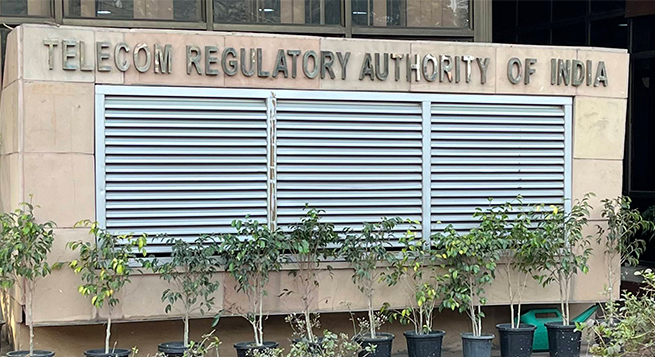TRAI yesterday came out with a slew of suggestions on further easing of doing business, recommending infrastructure status for the broadcast and cable sectors, apart from having more synergies amongst government agencies for services related to space and satellites.
“The government may consider and grant ‘Infrastructure Status’ to broadcasting and cable services sector,” the Telecom Regulatory Authority of India said in its recommendations on Ease of Doing Business in Telecom and Broadcasting Sectors.
Pointing out that ease of doing business (EoDB) is “not a one-time activity”, but a “continuous process”, TRAI while hailing some initiatives of various government agencies, pointed out more synergy is needed amongst various organisations like the Ministry of Information & Broadcasting, Ministry of Communication’s Department of Telecommunications, Ministry of Electronics & IT (Meity) and Department of Space, which falls under the purview of Prime Minister’s Office.
In what could be a relief for sports broadcasters, TRAI said, “WPC (Wireless, Planning & Coordination Wing of DoT) should charge the spectrum royalty fee for temporary uplinking of live events on pro-rata basis for actual number of days of the event.”
The Wireless Planning & Coordination Wing is an unit of the Department of Telecommunications coming under the Ministry of Communications. The department is responsible for issuing amateur radio licenses, allotting the frequency spectrum and monitoring the frequency spectrum.
Some of the salient features of these recommendations are the following:
# A user-friendly, transparent and responsive digital single window system based portal should be established. The portal should be enabled with new digital technologies for achieving end-to-end inter-departmental online processes.
# Each Ministry should establish a standing EoDB Committee to regularly review, simplify and update the existing processes and ensure ease of doing business as an on-going activity.
# MIB, DoT, DoS, MeitY and other agencies should specify stage-wise timelines for all the processes, including initial as well as additional permissions, which should be mentioned in the respective guidelines/ policy and updated in the Citizen Charter.
# A simple mobile app should be developed by MIB for registration of LCOs. Requests for cancellation before five years should also be enabled.
# The RoW (right of way) portal (GatiShakti Sanchar Portal) should incorporate all the service providers, including LCOs. DoT should enable RoW approvals for LCOs also in consultation with MIB.
# MIB should maintain a common database of registered LCOs. List of the registered LCOs should also be made available to the public at large.
# In terms and conditions of DoT License Agreement for Unified License, the lawful interception monitoring demonstration of a new service in a single network may take place centrally at one LSA/ location.
# There should be a module in the single window portal to comply with the end-to-end requirements of rollout obligation process.
# The process of request for remote access to a network from foreign locations, and approval by DoT should be made online and time-bound.
# Government may revise the periodicity for submission by the ISPs for providing the details of ISP nodes or points of presence (PoP)with their locations and number of broadband/ leased/ dial up subscribers to once every year.
# The website blocking process should be incorporated on the single window portal.
# Submarine cable laying and repair in Indian Territorial Water and Exclusive Economic Zones (EEZ) of India and Cable Landing Stations in India should be classified as ‘Critical and Essential services’.
# Permissions of laying, operations and \maintenance of submarine cables network should also be made online as a part of SaralSanchar portal.
# A committee should review the international best practices and feasibility for identifying and declaring a special corridor in Indian marine context.
# The process of surrender of DoT license, issuance of no-objection certificates and release of bank guarantees to the service providers should be made simple, online and time-bound.
# Nomenclature of the frequency licensing process of WPC should be modified and termed as ‘Frequency Assignment’. Accordingly, terms and conditions should be amended. After SACFA clearance and NOCC carrier plan approval, a single Frequency Assignment letter should be issued by WPC. LoI, Decision Letter, WOL and Uplink Permission by NOCC should be eliminated. The frequency assignment letter should be considered as a final permission to commence services.
# To avoid duplicity in testing of telecommunications products, DoT should constitute a standing committee comprising two senior level officers of Joint Secretary level each from MeitY, DoT/WPC, TEC, BIS and two representatives from product manufacturers. The committee should clearly identify a single testing scheme under which the product needs to be tested.
# DoS should publish a list of Indian satellites details and the capacity availability and approved foreign satellites/satellite systems, their orbital locations, transponders and frequency availability and their other technical and security parameters on the single window portal.
# MIB/ DoT portals should be end-to-end integrated with the Department of Space (DoS) and fully functional for all services requiring space segment.
# Within DOS, the processes at New Space India Ltd. (NSIL) should also be online to ensure transparency and time-bound processing.
# The Inter-Ministerial Committee for Satellite Network Clearance (IMC-SNC) should meet at least once in two months or on receiving upon any application, whichever is earlier, to expedite the in-principle approvals. The meeting should be held online.
# With respect to hiring of foreign satellite capacity, TRAI reiterated that the current practice of permitting hiring of foreign capacity for a limited period of 3 to 5 years should be removed and the service licensees should be permitted to hire the foreign satellite capacities for a longer period as per need.
# Long term agreements with foreign satellite providers should be allowed to ensure business certainty. Such long-term agreement may be subject to the mission life of the satellite, plan of launch of a similar satellite by the country (ISRO), payment of requisite fees, etc.
The government may come out with a roadmap detailing the schedule of launch of communication satellites and availability of the domestic satellite capacities in India to facilitate the service licensees to plan and optimize their capacity procurement.
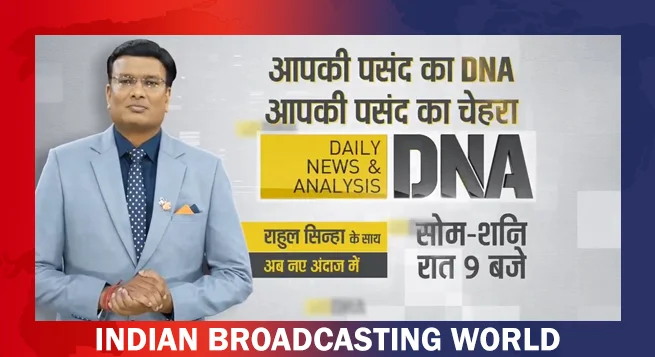 Rahul Sinha takes charge of Zee News’ DNA
Rahul Sinha takes charge of Zee News’ DNA 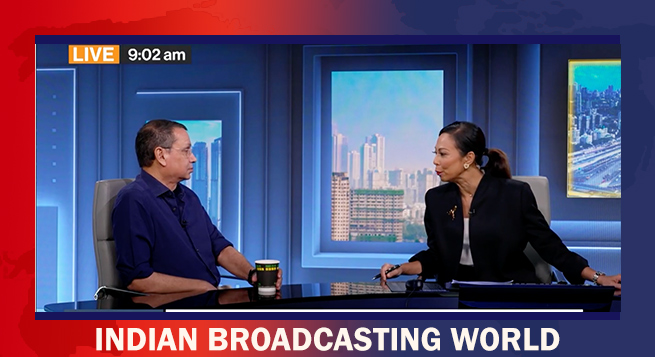 JioStar vice-chair Uday Shankar on surge in streaming subs, trade tariff challenges
JioStar vice-chair Uday Shankar on surge in streaming subs, trade tariff challenges 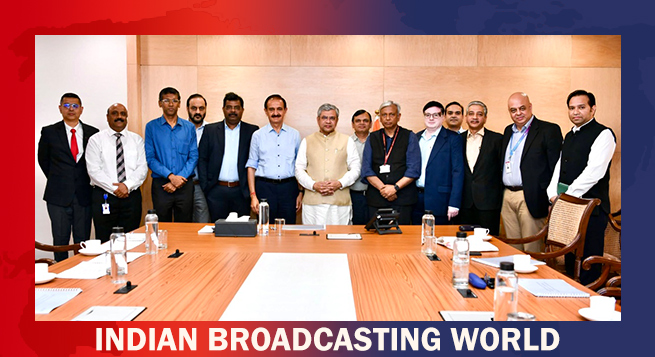 AIDCF team discusses industry issues with Vaishnaw
AIDCF team discusses industry issues with Vaishnaw 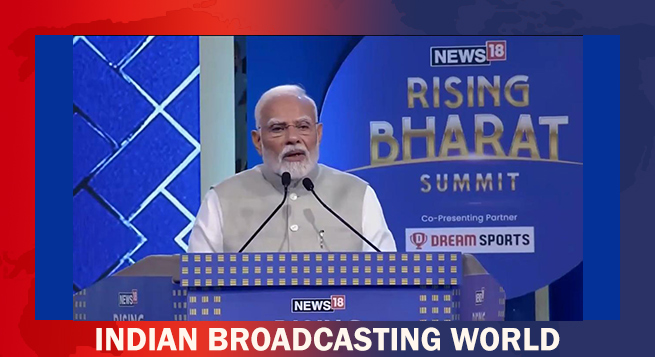 PM Modi: WAVES will empower Indian content creators go global
PM Modi: WAVES will empower Indian content creators go global  Sunrise Spices, Hoichoi celebrate Bengal’s essence with ‘Swadkahon’ cultural showcase
Sunrise Spices, Hoichoi celebrate Bengal’s essence with ‘Swadkahon’ cultural showcase  Spotify launches Ad Exchange, generative AI ads in India
Spotify launches Ad Exchange, generative AI ads in India 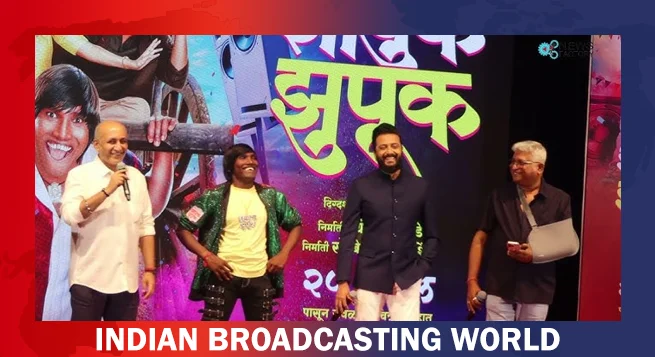 Riteish Deshmukh unveils trailer of ‘ Zapuk Zupuk’
Riteish Deshmukh unveils trailer of ‘ Zapuk Zupuk’ 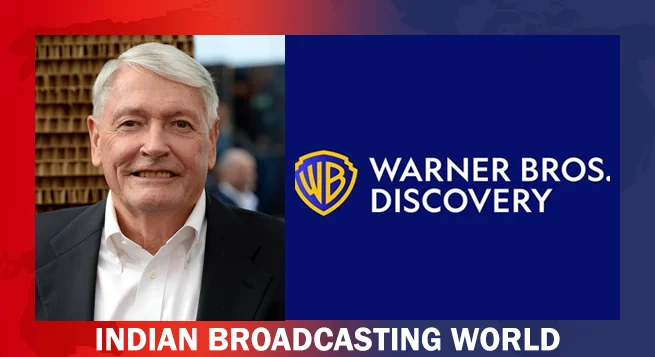 John Malone to step down from WBD board
John Malone to step down from WBD board  ‘Khudaya Ishq’ song from ‘Abir Gulal’ released today
‘Khudaya Ishq’ song from ‘Abir Gulal’ released today 


